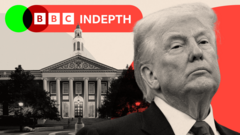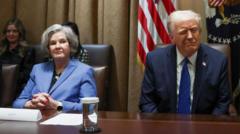A technology executive with links to the Chinese Communist Party was granted exclusive access to the White House by purchasing President Trump’s cryptocurrency, highlighting contradictions in the administration’s approach.
### VIP Access or Security Risk? The Trump Administration's Ties with Chinese Investors

### VIP Access or Security Risk? The Trump Administration's Ties with Chinese Investors
As the Trump administration confronts alleged security threats from Chinese visitors, a recent event raises questions about its selective engagement with them.
On June 6, 2025, news emerged concerning the Trump administration's perceptions and treatment of individuals from China, particularly those linked to its Communist Party. This issue gained attention after He Tianying, a significant buyer of Trump's meme-inspired cryptocurrency, was welcomed at a White House dinner, raising eyebrows about potential security implications.
The Trump administration has consistently warned against accepting visitors with connections to the Communist Party of China, emphasizing national security concerns as a foundation for this stance. Nevertheless, the case of He, a member of the Chinese People's Political Consultative Conference (C.P.P.C.C)—a body recognized for promoting the influence of the Communist Party—illustrates a hypocritical leniency.
Despite Mr. He being noted as a non-member of the Communist Party, his stature as a C.P.P.C.C delegate and his involvement in influence-building within China prompt scrutiny. Registration documents identify him as a Hong Kong resident and a member of the science and technology committee within his district's political advisory group.
The White House event, part of a promotional strategy launched in connection with Trump's cryptocurrency, offered significant rewards to leading purchasers, including direct access to the president. This approach raises pressing questions: Can a coherent national security strategy truly coexist with investment-driven access for individuals associated with the very entity the administration claims to guard against?
Critics argue that the administration's actions could compromise the messaging surrounding national security, particularly with respect to dealings with foreign entities. By promoting commercial interests, the optics of such events suggest a conflicting narrative regarding security threats.
As discussions around foreign influence intensify, how the Trump administration balances national security concerns with economic incentives for overseas investors remains a pivotal topic in the ongoing discourse about U.S.-China relations. Analysts suggest that scrutiny should be applied not only to direct connections with the Communist Party but also to how policies are enacted in practice versus how they are communicated.
The Trump administration has consistently warned against accepting visitors with connections to the Communist Party of China, emphasizing national security concerns as a foundation for this stance. Nevertheless, the case of He, a member of the Chinese People's Political Consultative Conference (C.P.P.C.C)—a body recognized for promoting the influence of the Communist Party—illustrates a hypocritical leniency.
Despite Mr. He being noted as a non-member of the Communist Party, his stature as a C.P.P.C.C delegate and his involvement in influence-building within China prompt scrutiny. Registration documents identify him as a Hong Kong resident and a member of the science and technology committee within his district's political advisory group.
The White House event, part of a promotional strategy launched in connection with Trump's cryptocurrency, offered significant rewards to leading purchasers, including direct access to the president. This approach raises pressing questions: Can a coherent national security strategy truly coexist with investment-driven access for individuals associated with the very entity the administration claims to guard against?
Critics argue that the administration's actions could compromise the messaging surrounding national security, particularly with respect to dealings with foreign entities. By promoting commercial interests, the optics of such events suggest a conflicting narrative regarding security threats.
As discussions around foreign influence intensify, how the Trump administration balances national security concerns with economic incentives for overseas investors remains a pivotal topic in the ongoing discourse about U.S.-China relations. Analysts suggest that scrutiny should be applied not only to direct connections with the Communist Party but also to how policies are enacted in practice versus how they are communicated.





















